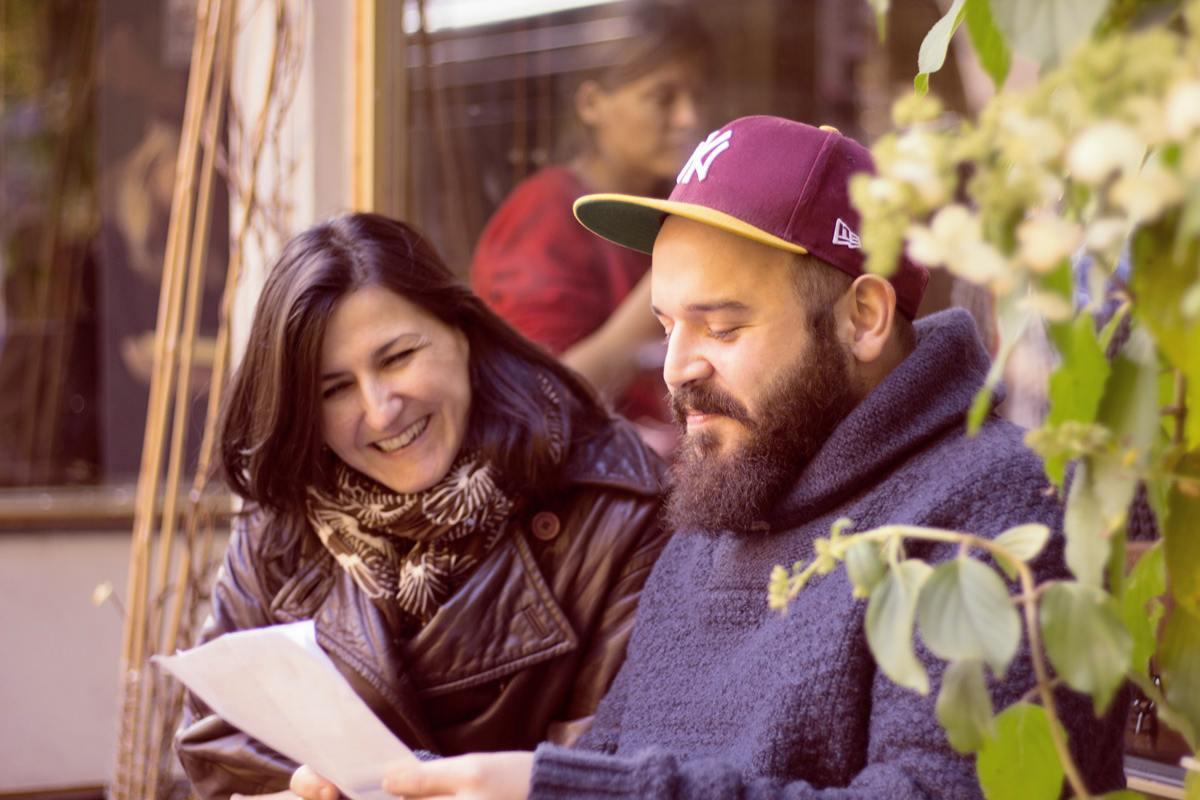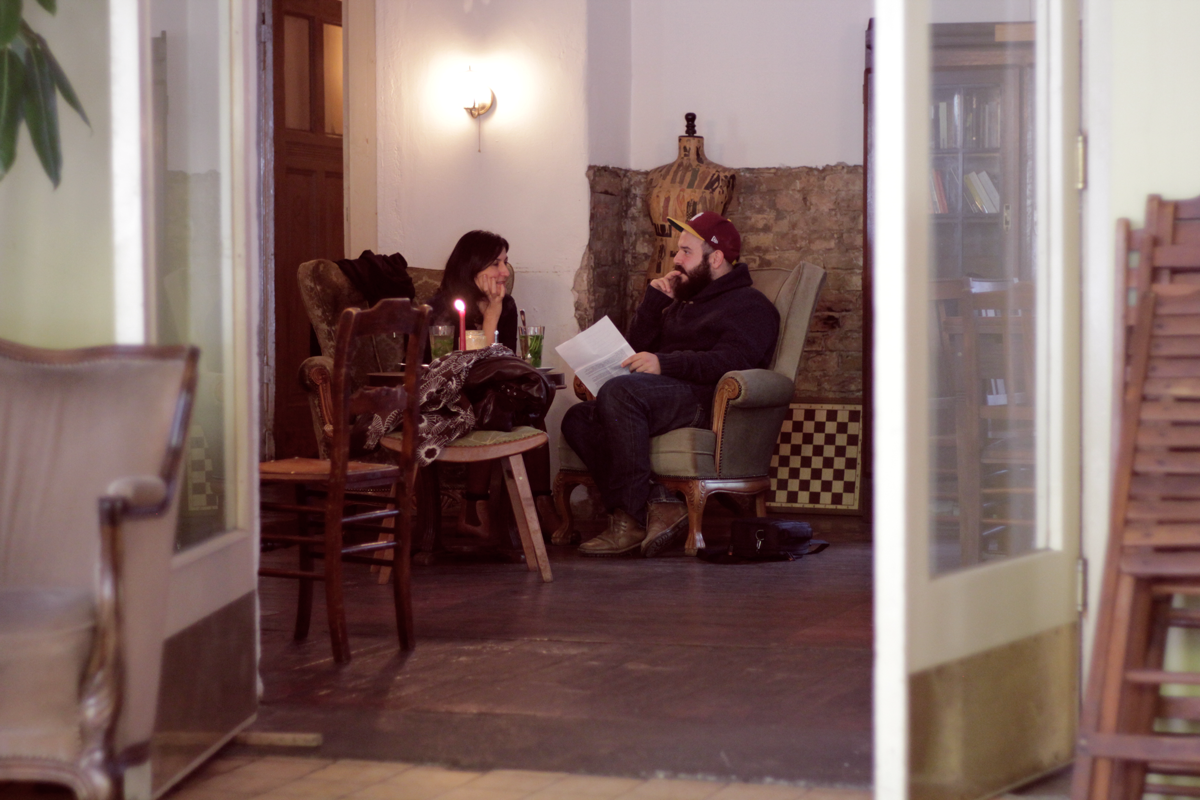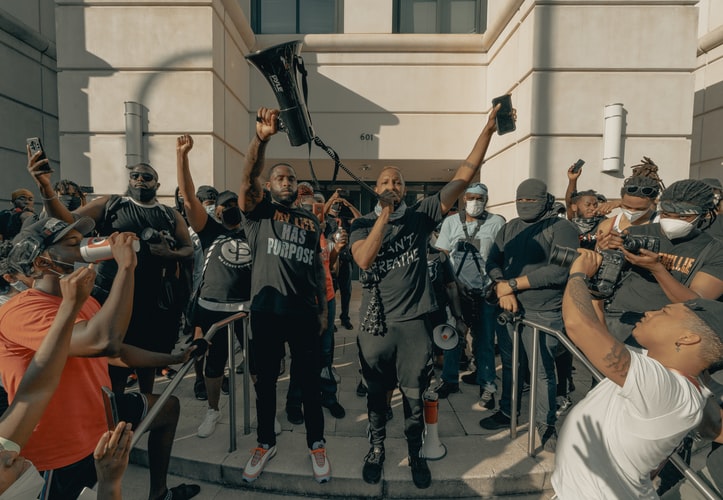Clichés are often used in a film as “tools” in order to introduce the viewer to the respective story. Italians are mafia bosses who wave their hands about like wild chickens, Africans are petty criminals that sell weed around the corner, Russians have red vodka noses and Turkish women wear a headscarf and don’t speak German.
But German cinema is getting better!
There are more and more films with a multicultural context where the story is in the foreground and these stereotypes are avoided. Yet, I have a feeling that it will still take a long time before it really becomes mainstream. So, I met with actress Şiir Eloğlu and spoke with her about this problem and her experience as a German-Turkish actress in Germany.
Şiir received her beautiful name from her father. In English it means “poem”. The Istanbul-born actress grew up in Cologne and now lives in Berlin. Aside from her role in the successful feature film “Almanya – Welcome to Germany” directed by Yasemin Şamdereli, she has had countless appearances in films and television series such as “Evet, ich will,” “Happy Birthday, Türke,” “Tatort,” and “Gute Zeiten, schlechte Zeiten.” She had her breakthrough in 1993 with the television series “Stadtklinik,” in which she played the role of a doctor.
Hello Şiir, your last role was not long ago in Buket Alakuş’ film “Hans mit scharfer Soße,” (engl. Hans with Spicy Sauce – ed.), which was presented at the film festival in Hamburg. Tell us a little about your role and the the shooting on set.
The film is about a 34-year-old journalist named Hatice (Idil Üner) who comes from a traditional but non-religious family and is still single. The father of the family was played by Adnan Maral, a colleague of mine with whom I had previously shot a feature film with before. My role was that of the mother, the lady of the house. There was mostly a great mood on set. We were all Turks and, for a change, some “original” Turks. Buket had consciously chose this cast because there is definitely another energy when Turks tell about Turks and play them. It was like a small family blues that arose there. For example, one time we had to wait because the technical staff wasn’t ready yet. At some point, Idil began singing a Turkish song and it ended with us dancing and singing with the entire team for about 20 minutes. We infected the Germans then, too. We had a lot of fun during shooting and I believe you can feel that in the film.
Hatice Akyün’s eponymous bestseller was the template for the screenplay. How do think the film with do with audiences?
I believe that German prefers to see comedies with Turkish personal over tragedies. Even though the past has shown that tragedies also do well, I have the feeling that when one shows a Turkish family with its warmth and joviality – like in “Almanya,” that that leaves behind a large impression and people enjoy seeing that the most.
In Hamburg at the premiere the film was well-received and had a lot of success.
What was the nicest and most horrible experience that you had on set or in general as an actress?
I find it hard to pin down the most beautiful experience because there were so many nice moments. “Hans mit scharfer Soße” was really wonderful.
Five years ago I played in the film “180°” by Cihan Inan, a director from the theatre. It was an extremely intensive collaboration and later a friendship developed out of it. Something like that doesn’t happen every day. It’s nice when a continuity arises between creative colleagues.
The worst experience that had is luckily a long ways back. It had to do with a Turkish couple with a sick child and had been thought of for a doctor series.
I had the received an offer for role of the mother, a role that was offered to me 95% of the time. On set the costume designer stuck me in outrageous clothes. I was given a salmon-coloured pants suit that was much too large on me and in which you saw nothing of my body. Along with that, a headscarf that didn’t match. My male colleague didn’t have it any better, he looked like a parrot. Anyway, on set, when we were supposed to play the roles, we of course spoke normal standard German because in the screenplay there was nothing about pronunciation. The director came to us afterwards and said that we would have to play a bit of a Turkish cliché. I look down at myself for a second and then asked him if my outfit wasn’t enough. Then we had to speak “broken” German again. The problem is that it sounds very strange when I do. With “Hans mit scharfer Soße” that was great because it was a comedy and therefore it has some slightly caricaturistic threads. But this here was a serious topic. I speak how I speak and if someone wants me to not speak good German, then I have to practice that, and so they should communicate that to me beforehand. I don’t have anything against roles with headscarves or figures with Turkish accents but I want that to be clear, because the reasons behind it can be diverse. And if there is no comprehensible reason for it, then I speak standard German. After that experience I swore I would never fall into this cliché trap.
You father Metin Eloğlu was an artist and lyricist in Istanbul. How much did he influence or inspire your life or your career as an actress?
My parents separated quite early. I was 4 years old when I came to Germany with my mother. I always knew that my father was an artist. Unfortunately, he died 3 years after I began my acting studies and started dealing with him more intensively.
Later I learned while reading his biography that he had actually wanted to become an actor. That was a new insight for me. Even my mother didn’t know about it. I found it very characteristic of him that he would have told strangers that but not the closest people to him, especially not us. He was a great individualist who had problems with any type of authority. He released some of his works under different pseudonyms, but always with the same letters of his name, just combined differently.
You could say that he was a “crazy guy.” Almost 30 years after his death, his work was published in Germany. That is due to the two girls from Binooki (Inci Bürhaniye and Selma Wels, managers of Binooki, a Berliner publishing house that publishes Turkish literature in German).
I cannot explain why so many South American writers have been translated left and right but Turkish literature right in front of your nose, that of your immediate neighbours, hasn’t beeb. Interestingly, the girls told me that Turkish publishers wonder why there is still such little interest in Turkish literature in Germany. In China, for example, there is a large interest in Turkish literature. Perhaps it has to do a little with the prevalent image in Germany of Turkish culture.

Looking at your filmography one can see that you play many different types of roles. How important is variation for you?
It’s very important for me, of course. No one becomes an actress in order to just play one specific role. That wouldn’t be interesting, at least not for me. I think I am confined to Turkish figures. That has to do with my name, but also with the lack of imagination of the part of those who cast me. Since I’ve gotten a little bit older, I realise how the diversity of the roles has become smaller. I’m now in the age of “mother roles,” with which I have nothing against. However the depiction of these figures is often still dealt with in a quite old-fashioned way.
Not just linguistically or concerning the costume, but also how the roles are located. The women are a little bit in the second row, behind the man. That may exist, but I don’t know why we have to keep telling that story. For me, simply too few Turkish roles appear. I believe the diversity of Turkish everyday life is missing. Of course, there are exceptions, especially with the newer filmmakers and those who write the books. Some are aware that the Turk isn’t always the fool from Anatolia. But it is still a long way until Laramie, until that arrives at the end of the chain, meaning those who make the decisions. Successes like “When We Leave” show me that such topics are still gladly accepted. The oppressed Turk who has to free herself from the shackles of religion and conventions. Sorry, but I know a lot of others. Of course there are such cases, I don’t want to question that. But when you make a film about a minority in this country, then an impression can easily be created that what the film deals with is normal in this minority. This isn’t true, though. That’s why I thought “Almanya” was a really nice film because it showed a normal family and was successful. Although there wasn’t one single “star” in the main cast. So much for the casting politics of the broadcasters and producers! They’re of the opinion that you need names. No! For my taste, we just need more compelling stories and exciting actors. We don’t need anything else.
What job would you have had if you hadn’t become an actress?
Ohhh, maybe a cook?! I like to cook. But it would have been too hidden for me. I am someone who likes to be seen. What I find sad about acting is that your field is geographically limited through the language to a few countries. Unfortunately, I am very happy and content with how it is.
What can make you very angry?
Privately, I get very angry if lied to. And when these come to light, it’s very bad. What I also can’t stand is when I have the feeling that the person opposite me isn’t taking me seriously and it becomes very bad when one underestimates me. Career-wise I can get very angry when someone tries to tell me, as a Turk, what Turks are like. No one has to tell me what Turks are like, how they act around each other, how they speak and what they wear. I find it presumptuous when a costume designer hands me a headscarf and says: “You know how to tie it, right?” That’s doesn’t fly. That’s her job, not mine. And for some, it’s daunting that Turkish actors are used to two cultures. German actors are also cast for a Turkish role. If you ask me, that works very rarely. For example, when a mother pinches her child’s cheek with her middle and index finger; details like that are very important. No German mother does that, because she uses her thumb and index finger. A small, but fine detail. There are certain gestures that one has to simply acquire beforehand.

So, how can one make you happy?
As an actress, one can make me happy by giving me very complex roles that are completely independent of where they are from. Especially when one trusts me with one where one doesn’t know immediately after watching what I just played. I would like to be taken seriously as an actress with my skills. Because I can play not only the Turkish mother but the German one as well.
Which film is your personal favourite?
There are a few. One of them is “The Bridges of Madison Country” with Clint Eastwood and Meryl Streep. If you watch the film in its original version, it is a completely different world. Meryl Streep plays an Italian in it.
It’s completely audacious that she speaks perfect standard German in the German translation. Everything that Meryl Streep worked for artistically, the grammatical mistakes, the pronunciation, all of that was eliminated. It’s a lack of respect of her work as an actress.
In your opinion, is there something that the film and television landscape should learn concerning multiculturalism?
Learning has such a pedagogical ring to it that I like to distance myself from. But I do believe that the multicultural reality in Germany is a different one from the one that is communicated to us mainly in television, but also in film. It’s just not so, that Germans only have German friends or that only Germans work in a hospital. In “real” life, Germans work with Asians, Africans and Eastern Europeans. But in a doctor series, this doesn’t exist. Of course, if one tries to to “desperately” call up multiculturalism, it can go down the tubes quite quickly. Until Gülcan came – regardless of what I think of her – until then, minorities were present in television with distinctly fewer people form society. One tries to imitate America, but we aren’t in America. Here, the largest minority isn’t black or Asian. Here, the largest minority is Middle-Eastern, Greek, Italian and Eastern European. I don’t get it. I have nothing against the moderators, against no one, I don’t want to be misunderstood. It’s just horrible that the background of certain people is always functionalised, and always in a certain way. Millions of people and their opinions are not taken into account when calculating the television ratings because they don’t have an EU passport. So long as nothing changes there, nothing will change to that effect. A view of reality just has to be sharpened again, and that starts with each individual. For a change, just look left and right with open eyes and see what it is really like.




